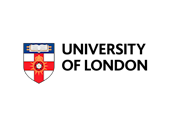
University of London

The University of London is the UK’s leading provider of digital and blended distance education internationally, established by Royal Charter in 1836 and now offering programmes to 45,000 students in 190 countries around the world. Although proudly rooted in London, our community and impact are global. It is a national leader in the humanities, promoting their value to society and the economy through knowledge creation and exchange, through the research institutes within the School of Advanced Study – a national centre for the promotion and facilitation of research in the humanities. As early as 1921, the Institute of Historical Research was formed as a laboratory of ideas in the study of history, and today the Institute of Philosophy’s Centre for the Study of the Senses pioneers significant lab-based collaborations between philosophers, psychologists and neuroscientists. Our research concentrates on the human dimensions to societal challenges. To confront climate change, global mobility, social injustice, human rights, poverty, we will need to understand the human world and to appreciate the critical importance of cultures, languages and identities to the contemporary world. This is at the heart of our research.
The University of London is also a federation of 17 esteemed higher education institutions, with collaboration at the heart of our ethos. The University of London federation is a collective community of more than 240,000 learners and 50,000 staff, delivering world-leading research across all disciplines. Our passion for increasing access to education and mobilising the collective power and expertise of the federation is central to our ability to transform lives around the world and address the global challenges of the future.
Links
Displaying 41 - 60 of 87 articles




















